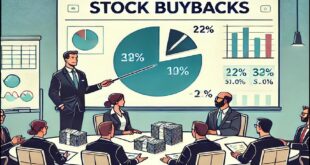Conventional financial theory relies upon the seemingly sensible ideas of exogenous cause and rational reaction. Papers are packed with discussions of “exogenous shocks,” “fundamentals,” “input,” “catalysts” and “triggers.” Stunningly, as far as I can determine, no evidence supports these ideas, as the discussion below will show.
cause and rational reaction. Papers are packed with discussions of “exogenous shocks,” “fundamentals,” “input,” “catalysts” and “triggers.” Stunningly, as far as I can determine, no evidence supports these ideas, as the discussion below will show.
By Vadim Pokhlebkin/Robert Prechter (elliottwave.com) originally entitled* The Fundamental Flaw in Conventional Financial and Macroeconomic Theory”.
…The Efficient Market Hypothesis argues that as new information enters the marketplace, investors revalue stocks accordingly. This is a simple idea and simple to test but almost no one ever bothers to test it. According to the mindset of conventional economists, no one needs to test it; it just feels right; it must be right.
[Many investment myths abound and this series of articles analyzes the 10 most popular as to their veracity. In Part 1 we] “Test Exogenous-Cause Relationships vs. Economic Events” [as we analyze:]Claim #1: “Interest rates drive stock prices.”
This is a no-brainer, right? Economic theory holds that bonds compete with stocks for investment funds.
- The higher the income that investors can get from safe bonds, the less attractive is a set rate of dividend payout from stocks;
- Conversely, the less income that investors can get from safe bonds, the more attractive is a set rate of dividend payout from stocks.
The above appears to be a sensible statement, and it would be if it were made in the field of economics. For example, “Rising prices for beef make chicken a more attractive purchase.” This statement is simple and true but in the field of finance such statements fly directly in the face of the evidence. Figure 3 below shows a history of the four biggest stock market declines of the past hundred years. They display routs of 54% to 89%.
Figure 3

In all these cases, interest rates fell, and in two of those cases they went all the way to zero! In those cases, investors should have traded all their bonds for stocks – but they didn’t. Instead, they sold stocks and bought bonds. What is it about the value of dividends that investors fail to understand? Don’t they get it?
As in most arguments from exogenous cause, one can argue just as effectively the opposite side of the claim. It is just as easy to sound rational and objective when saying this: “When an economy implodes, corporate values fall, depressing the stock market. At the same time, demand for loans falls, depressing interest rates. In other words, when the economy contracts, both of these trends move down together. Conversely, when the economy expands, both of these trends move up together. This thesis explains why interest rates and stock prices go in the same direction.” See? Just as rational and sensible. On this basis, suddenly the examples in Figure 3 are explained and so are the examples in Figure 4. Right?
Figure 4

No, they’re not, because, as the first version of the claim would have it, there in fact have been plenty of times when the stock prices rose and interest rates fell. This was true, for example, from 1984 to 1987, when stock prices more than doubled, and there have been plenty of times when stock prices fell and interest rates rose, as in 1973-1974 when stock prices were cut nearly in half. Figures 5 and 6 show examples.
Figure 5

Figure 6

You can’t take the equally sensible opposite exogenous-cause argument as valid, either, and you certainly cannot accept both of them at the same time, because they are contradictory.
At this point, conventional theorists might try formulating a complex web of interrelationships to explain these changing, contradictory correlations but I have yet to read that any such approach has given any economist an edge in forecasting interest rates, stock prices or the relationship between them.
To conclude, sensible-sounding statements about utility-maximizing behavior (per the first explanation) and about mechanical relationships in finance (per the second explanation) fail to capture what is going on.
Events and conditions do not make investors behave in any particular way that can be identified. Economists who assert a relationship (1) believe in their bedrock theory and (2) never check the data.
[The above article is presented by Lorimer Wilson, editor of www.munKNEE.com and www.FinancialArticleSummariesToday.com and the FREE Market Intelligence Report newsletter (sample here – register here) and may have been edited ([ ]), abridged (…) and/or reformatted (some sub-titles and bold/italics emphases) for the sake of clarity and brevity to ensure a fast and easy read. The author’s views and conclusions are unaltered and no personal comments have been included to maintain the integrity of the original article. This paragraph must be included in any article re-posting to avoid copyright infringement.]
*http://www.elliottwave.com/freeupdates/archives/2014/09/08/Don-t-Get-Ruined-by-These-10-Popular-Investment-Myths-%28Part-I%29.aspx#axzz3IOE2gK92 (© 2014 Elliott Wave International)
If you liked this article then “Follow the munKNEE” & get each new post via
- Our Newsletter (sample here)
- Twitter (#munknee)
Most economists (primarily Keynesians and monetarists) believe that authorities can control the money supply and interest rates, and most neo-Austrians believe that the Fed is all-powerful when it comes to inflating – that whatever inflation rate it wants, it simply manufactures. Is that true or false? Read on for the answer. Read More »
2. True or False: Inflation Makes Gold & Silver Go Up
This one seems like a no-brainer. The government or the central bank prints more bonds, notes and bills, and prices for things go up in response. Gold is real money, so it must fluctuate along with the inflation rate. It’s basic physics but it doesn’t happen that way. Let’s examine the history of inflation and the precious metals since the low of the Great Depression. Read More »
3. True or False: A Terrorist Attack Would Cause the Stock Market to Drop
It would seem logical to say that peace allows companies to focus on manufacturing goods, providing services, innovation and competition, all of which helps the overall economy but does peace, in fact, have anything to do with determining stock prices? Read More »
5. True or False: Rising Oil Prices Are Bearish For Stocks
A sensible story of causation regarding oil prices and stock prices made by countless economists is that “rising oil prices increase the cost of energy and therefore reduce corporate profits and consumers’ spending power, thus putting drags on stock prices and the economy.” Stunningly, as far as I can determine, however, no evidence supports that claim, as the discussion below will show. Read More »
6. True or False: An Expanding Trade Deficit Is Bearish For Stock Market?
Q: Is it correct to assume throughout that an expanding trade deficit impacts the economy negatively? A: No, the relationship, if there is one, is that there has been a positive — not negative — correlation between the stock market and the trade deficit. Let me explain. Read More »
7. True or False: Earnings Drive Stock Prices
The belief that earnings drive stock prices powers the bulk of the research on Wall Street but this glaring exception to the idea of a causal relationship between corporate earnings and stock prices challenges that theory. Let me explain. Read More »
8. True or False: Wars Affect Performance of Stock Markets
It is common for economists to offer a forecast for the stock market yet add a caveat to the effect that “If a war shock or terrorist attack occurs, then I would have to modify my outlook.” As such, it would seem logical to assume that…they must have access to a study showing that such events affect the stock market, right? The answer is no, for the same reason that they do not check relationships between interest rates, oil prices or the trade balance and the stock market. The causality just seems too sensible to doubt. Read More »
9. True or False: GDP Drives Stock Market Up & Down
Macroeconomic news supposedly explains only about one fifth of the movement in stock prices but if there is no accommodating theory, then the presumed causality involved is tenuous at best. Let me explain. Read More »
 munKNEE.com Your Key to Making Money
munKNEE.com Your Key to Making Money


